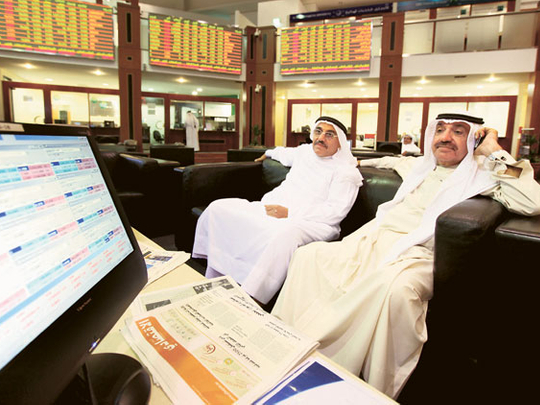
Dubai: The euro's appreciation against the dollar aided in reducing the losses of GCC domestic funds to less than one per cent in the first six months of the year.
However, most funds experienced increased money outflows, which are expected to stabilise in the last quarter.
The overall decline of 0.63 per cent of GCC-domiciled funds, according to Lipper, was despite all regional markets closing negatively at the end of June amid unprecedented political unrest in the Mena region, doubts about global recovery, inflationary pressures from emerging countries and difficulties related to sovereign debt in Europe and United States.
Except for bond and mixed assets funds, all other categories witnessed significant decreases. Gulf News obtained exclusive access to data, which will be publicly released shortly.
The relatively small drop was due to strong performance outside the GCC frontier, mainly in Europe where investors took advantage of the appreciation of the euro against the dollar, said Paris-based Dunny Moonesawmy, head of fund research for Western Europe, Middle East and Africa at Thomson Reuters.
"It is clear that even faced with a deep crisis in the Eurozone, the euro showed strong resistance," he said. "GCC investors gained from the 7 per cent decline of the US dollar against the euro over the first half, reflected mainly in bond funds as the European equity markets were mainly in negative territory.
"When currency appreciation is disregarded, stock investments have been in the red in most regions and sectors."
With the ongoing global economic turmoil, Moonesawmy expects money outflows in the third quarter to be "bad". "But end of the year should be better as the situation stabilises," he said.
Best performing
The Bond Global category was the best performing one gaining 5.31 per cent followed by the Bond Emerging Markets Global category with a 4.5 per cent jump.
These two categories remained the best performing ones over three- and five-year periods, up 9.44 per cent and 23.61 per cent for the Bond Global category and 1.4 per cent and 4.74 per cent for the Emerging Markets category.
When it comes to equity funds, Equity Egypt lost 25 per cent, Equity Kuwait lost 5.48 per cent, while the Equity GCC category resisted better than the Mena category, the former decreasing 2.65 per cent against the latter's decline of 3.52 per cent.
"The consequence of political unrest on economic activity is important but at the same time GCC countries are fundamentally strong with either good revenue stream such as Saudi Arabia and Qatar or a diversified economy as is the case with Bahrain," said Moonesawmy.
Similar performance reviews over three- and five-year shows that investors took advantage of their emerging markets investments in the long-run, says Moonesawmy.
The Equity Asia Pacific excluding Japan category posted 16.36 per cent performance over three years and 58.82 per cent over five years.
Emerging markets
The Equity Emerging Markets Global category was slightly negative over three years (-2.62 per cent) but strongly positive over five years (75.52 per cent).
Conversely, the Equity GCC category lost 37.25 per cent over three years, even though it gained 10.91 per cent over one year in 2010.
The performance remained in the red over five years, declining 9.06 per cent. Considering all equity funds registered for sale in the GCC, both domestic and foreign funds, they were almost flat during first half 2011 by gaining 0.29 per cent, which contrasted with the 4.65 per cent decline recorded during first half 2010, according to data from Lipper, a Thomson Reuters company.
Money market funds exhibited contrasting performance since the beginning of the year, the data shows.
"The depreciation of the dollar played an important role for strong performance of funds invested in the Swiss franc and the euro, which rose by 10.72 per cent and 8.36 per cent respectively," said Moonesawmy.
"Conversely, the low interest rate environment maintained returns at low levels in Money Market USD funds [0.19 per cent] and money market funds invested in Saudi Arabia [0.49 per cent]."
Islamic funds
Finally, the 190 Islamic funds with a minimum of six months track record ended the first half of the year with a 0.51 per cent return.
All asset classes recorded positive returns except equity funds whose 111 funds performed negatively by 0.12 per cent on average.
Real estate and bond funds displayed very good first-half performance, increasing by 4.4 per cent and 3 per cent respectively.
Islamic funds demonstrated stronger performance on average than their conventional peers and for a reason, said Moonesawmy.
"While the segment has been affected by the Dubai World debt issues, fund managers seem to have integrated in their management process a more cautious approach with regards to risk," he said.












